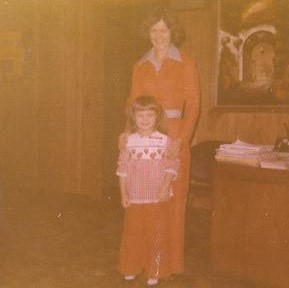When I was five years old, I was on a local children’s television show, “Kids’ Stuff.” I remember being outfitted in my red and white pantsuit, with my two ponytails swinging, excited. I regularly watched the program at home and couldn’t wait to be in on the action.
As the cameras rolled, the tall, pretty host- let’s call her Miss Jane- started a game for the hyper bunch of us tykes. It was called, “The Stand- Up Game.” There was a large circle of different colored smaller circles on the floor. Each kid was to sit on that circle, quietly and patiently (yeah, sure), only standing when our colored circle was yelled out in song.
I believe I was on the red circle (probably because it matched my outfit).
Miss Jane sang…
“Green stand up. Blue stand up. Orange stand up. Yellow and purple stand up…”
Simple enough. Only, little red me stood up, sat back down and stood up again, on EVERY color. Miss Jane hadn’t even gotten to red yet. I was so excited, I guess, just to be on the color wheel, I was all, “stand, up, sit down, Kids’ Stuff, Kids’ Stuff, Kids’ Stuff!”
Years later, I still have the sing-song-y lyrics in my head. And I see how, I was primed to exhaust myself in a few unproductive patterns. I may no longer be outfitted in my red and white pantsuit. I may no longer be sitting on my red circle. But I was standing up for every ridiculous thing, attending to the never-ending different circumstances, while attempting to manage (hah) life.
And it prompted another song from years ago, the band, Everclear’s “Everything To Everyone.”
Behold, some of its lyrics:
“You do what you do
You say what you say
You try to be everything to everyone
You know all the right people
You play all the right games
You always try to be
Everything to everyone
Yeah you do it again
You always do it again”
Song dysfunction, but for grownups!
I started to see just how rampant my people pleaser/codependent ways were running amuck in my life. However, now, in the past two years, since my cancer diagnosis, I’ve had to face just exactly what that means as I’ve chosen to engage in the not-so-fun-and-games behaviors.
If Miss Jane’s game was my template, indeed, I was standing up for everything. And it could kill me.
Not Everyone is Going to Like You:
Let’s go straight to the heart of the dysfunction. This is Lesson 101, to the recovering people pleaser. And, it can feel like the most shrill, painful siren, blaring in our ears.
“No! Don’t tell me that! I can make someone love me. Really! I’ll just keep working at it!”
An-n-n-n-d… “green stand up, yellow stand up, purple stand up…”
I had to admit that my attempts to be liked by everyone just weren’t happening. I would tire myself out, thinking of ways to get on someone’s “good side.” But what I failed to see or accept is that their entire being, complete with any potential, “good side” was disinterested and walking away from me.
I think we can sometimes get caught up in the mistaken belief that we have to be friends with everyone and, if we’re not, it’s a moral failure on our part.
It’s not.
Some people belong together in life. And some don’t. Changing, morphing and manipulating ourselves into a certain package, one we’re convinced will make us irresistible to that “special someone,” just depletes us, annoys them and possibly, in extreme cases, incurs a restraining order.
Nope, don’t want that.
And, all the while, we miss out on something key: we need to like ourselves, sans any other person’s approval. That, one can argue, may be the graduate school of our people pleasing natures, but learning this for ourselves is far less painful than learning the constant rejection of people who don’t want you and I and are not supposed to be in our lives, anyway.
Still, many of us struggle with this and are on academic probation, hence, the next learning lab…
Not Everyone’s Need is Your Need:
People pleasers want to fix things; we want to make others happy. This can be a recipe for disaster and disease as we often expend our entire beings trying to heal, solve and make things better. Furthermore, others can exploit our giving natures and sincere hearts.
Too often, I chose to be a rescue person to someone who’s life was always on fire. I wanted to help put the fire out. So, I spent hours listening to people on the phone. I gave out cash so their rent would be paid; they could have groceries.
Helping someone out is not bad, in and of itself, here. Life happens. Needs do arise.
However, I encountered a strange phenomenon in my sincere fire quenching. I quickly became the “go-to” person. I was not the last resort contacted in these too frequent emergencies; I was the first call, instead.
Maybe, I could have risen above it with my feelings. But my response, instead, was I felt used. On top of being sleep deprived, adrenalin-charged and sometimes, even, financially strapped myself, I could not escape the reality that, once someone got their need met, emergency or otherwise, I never heard from them. No uneventful phone call just to ask how I was doing. Nope. I was just there to meet a need. They wanted nothing else from me but that.
And that it not a good feeling. But I was the one choosing to participate in the behavior. I could have said no. I could have redirected them to other resources. But I didn’t. I thought I was the only help they’d encounter. Do or die.
Scripture, perhaps, offers us a caution here, found in Matthew 26:11:
“The poor you will always have with you…”
Now, this is not a free pass to be callous, to never help someone in need.
Rather, it’s pointing out an unfortunate reality: there will always be need in the world. One may argue, the need exceeds the help.
And each human being, like it or not, is finite. We only have so much capacity.
Therefore, it’s unrealistic- and even counterproductive- to go about trying to “save the world.” When our bodies and psyches give out (and they eventually will in the attempt), not only have we harmed ourselves in the endeavor, we may have also hurt the very individual we were trying to assist in the first place.
We are to be selective in how we go about helping. Not every need has our name on it. It’s not selfish to admit that. It is realistic.
I learned I cannot stand up to every problem and fix it; my Kid’s Stuff “Stand Up” game, with me standing at the beckon of every color, will not perfectly solve everything. It will, only tire me out.
I learned this the hard way. As I sincerely tried to be a firefighter and caregiver, I neglected myself. And, perhaps, my cancer diagnosis was the attention-getting device that put a stop to that neglect.
So, I’ve since learned to sit some needs out.
Pick Your Fights:
And this leads me to my next lesson; I must choose my battles. I’ve have had to learn it the hard way also.
Again, going back to Miss Jane and the Stand-Up game, the call was out for a certain colored circle.
Selective.
If green was called, then orange, yellow and blue had better just sit tight and wait.
This principle applies with any grownup battle, argument, fight or cause. I needed to ask myself, “Is this really my fight here?” Spiting ego, spiting emotion, spiting even, my desire to get involved in the whole mess, should I?
Would doing so help…or hinder?
My Kids’ Stuff experience should have warned me that I learned and practiced some behaviors that were not in my best interest as an adult.
Again, I was standing up for everything, yet, getting nothing accomplished, except wearing myself out. I made the fight in question, even worse, because all I was doing was, in fact, meddling.
Not helpful.
I remember one incident in which a family member asked me to do battle for her concerning a lawn ornament, taken from her yard. I was asked to contact the people in question and retrieve that lawn ornament. I got involved; I called and wrote a letter. Not surprisingly, there was no response.
Meanwhile, the person who asked me to be their lawn ornament henchman quietly sat back and did absolutely nothing. Not one word, phone call or letter. No effort, whatsoever. I was the only one doing the heavy lifting.
And there was, perhaps, my first mistaken belief. I viewed what I was doing was assisting. I believed this other party would do her share of the ornament retrieval as well.
No, in her mind, my help meant that I would do everything.
Years later, this incident seems ridiculous. It made me feel like I was engaged in a tug of war over some tacky pink flamingos. That kind of thing.
But again, I was getting involved with things that weren’t any of my business. If there was a dispute between certain people, then, that’s between them. Being an additional party only muddies the waters and makes things worse.
I should have sat this fight out.
Cancer, again, brought to my mind how I am to choose my battles wisely. I have finite energy, strength and, maybe even, time left.
Do I really want to spend it meddling in affairs that are unhealthy for me?
Even with a sincere heart to make things better, I need to do an ego check.
Perhaps my help won’t help.
Perhaps, it will only have the opposite effect. The ego loves to hear that, doesn’t it?
“Get over yourself.”
This should be the retort to the tempting Stand-Up game we play in life.
Why, exactly, should we stand up?
Is our colored circle being called? Is it?
Or do we want it to be called instead?
There’s a difference.
We need to know that difference and sit several things out.
Copyright © 2019 by Sheryle Cruse












Read 0 comments and reply